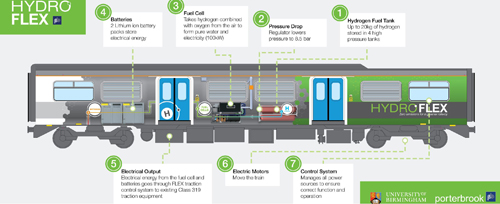Railway stock leasing company Porterbrook is helping to finance the UK’s first hydrogen-powered train, which will be tested on the mainline railway following a successful proof of concept.
Porterbrook has partnered with the University of Birmingham’s Centre for Railway Research and Education (BCRRE) to develop the HydroFLEX fuel cell train, which will play a critical role in helping to create a zero-emission railway in the future.
The HydroFLEX pilot involves the fitting of a hydrogen powerpack to an existing Class 319 electric train so it can run independently on routes that haven’t been electrified.
As the system can be fitted to current rolling stock, existing trains can be repurposed to extend their working life.
The fuel cell combines hydrogen from storage tanks with oxygen from the air to generate electricity; the only emission from the reaction is water.
Porterbrook and the University of Birmingham jointly provided £1 million finance to support the HydroFLEX demonstrator, while the university also secured grant funding from Innovate UK, through its First Of A Kind competition.
The leasing company is now in “active discussions” with clients about the future use of fuel cell trains on the rail network.
Mary Grant (pictured), chief executive officer of Porterbrook, said: “Sustainability and innovation are integral to what we do here at Porterbrook, and so we are tremendously proud to have played a key role in designing and building the UK’s first hydrogen train.
“This is a first test but we are excited about being in a position to provide HydroFLEX as a viable offering very soon. Britain’s railway has a key part to play in reducing transport emissions and we are committed to helping our customers play an important role in delivering this.”
Collaborators on the project included Chrysalis Rail for installation, Denchi Group for traction batteries, Ballard Fuel Cell Systems for the fuel cell, Luxfer for hydrogen storage tanks, DG8 design support, Derby Engineering Unit for panels and brackets, SNC Lavalin for design and hazard identifications, Aura for exterior livery design and dB Cargo Crewe for the recommissioning of the unit.
Porterbrook has also teamed up with Eminox to create a catalyst converter for diesel trains as part of its programme to reduce railway emissions.
Helen Simpson, head of innovation and technical services at Porterbrook, said: “The Porterbrook team are delighted to support the testing of HydroFLEX on mainline railways.
“We have been very pleased with how the train has performed on the test track and are looking forward to getting it out on the national rail network. Delivering the UK’s first hydrogen train is a huge step for the rail industry and marks a milestone for green transport everywhere.
“Demonstrating how mainline approvals for hydrogen can be delivered is the next step forward and allows more people to see the benefits of hydrogen.”
Alex Burrows, director at BCRRE, said: “This partnership between the University of Birmingham and Porterbrook has been a trailblazer for academia and industry accelerating ideas into practical application on the railway.”
Porterbrook owns almost one-third of the national passenger rail fleet in the UK and its portfolio of more than 5,000 vehicles has a net book value of nearly £2.2 billion. It rose from 13th to 11th in this year’s AF50 UK, the leading industry report into the country’s largest asset finance companies.
It has invested more than £3 billion in rail since 1996, including the commissioning of more than 2,500 new passenger and freight vehicles, with plans to invest a further £1 billion in the next five years.
In addition to financing rolling stock, it provides asset management to ensure the long-term performance of equipment over its full economic life.
Its customers include major UK rail companies, such as LNER, Cross Country, South Western Railway, East Midlands Trains, ScotRail and infrastructure provider Network Rail.
Recently, Porterbrook issued a call for suppliers to participate in its Innovation Hub 2020, an on-track demonstration unit that provides a showcase for new products and innovations.
The unit supports the Rail Supply Group’s ‘SME Growth through Collaboration’ programme, led by the Rail Forum Midlands.
Porterbrook created the Innovation Hub by re-purposing a four-car Class 319 train to serve as a working environment for a wide range of new technologies and passenger-facing improvements to be showcased and tested, with a focus on the small to medium-sized enterprises that play an integral role in the UK rail industry’s supply chain.



